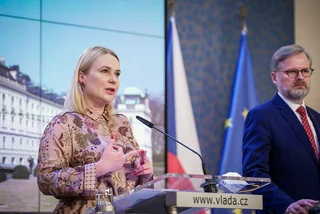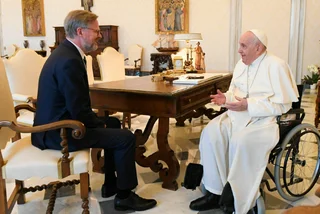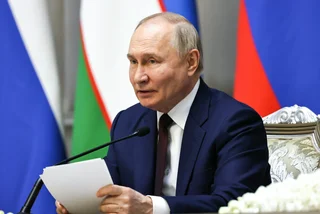EU Pavel praises database that logs Russian damage
Czech President Petr Pavel expressed the significance of establishing a registry of damages suffered by Ukraine as a crucial part of the Council of Europe's response to the Russian aggression. The annual budget of the new damage registry would be about EUR 7.1 million, with a minimum annual contribution of EUR 25,000 euros and a maximum of EUR 1.2 million.
At the Reykjavik summit, the majority of Council of Europe states, along with the EU Union and the U.S., supported this step, while countries like Hungary, Serbia, and Turkey did not. The registry, located in The Hague, will allow Ukrainian citizens and local authorities to report damages caused by Russian aggression in Ukraine.
TECH Digital identity moves ahead after government approval
The lower house today authorized the Digital Information Agency to create the eDoklady application. This will be an electronic alternative to the identity card starting next year.
The app would allow users to upload individual identification documents issued to citizens by state agencies. The eDokladovka application would also offer electronic authentication and digitize other services.
CRIME Two men charged in Czech womens' fall in Austrian Alps
Two men have been charged by the South Bohemian police in the negligent killing of two women during illegal mountain ascents in the Austrian Alps. The first incident occurred in 2019 when a man organized a group expedition on via Ferrata Wilddfrauensteig but sent an inexperienced friend as the group leader. Ignoring bad weather warnings, a 24-year-old woman slipped and suffered fatal injuries.
The second incident involved the same organizer, who failed to react to signs of exhaustion shown by another woman during an expedition on the Drachenwan via Ferrata in 2020. The police began investigating after a criminal complaint was filed by the second victim's family.
Russia Czechia nullifies resolutions on Russian diplomatic property
The Czech government today nullified nine resolutions from the 1970s and 1980s – issued under Communist Party-led Czechoslovakia – that enabled the then-Soviet Union to use real estate for diplomatic purposes for free. According to the Czech Ministry of Foreign Affairs, Russia is using the plots in Czechia for non-diplomatic purposes, and therefore there is no reason to continue to provide them free of charge.
The cancellation of the measure applies to almost 60 plots of land nationwide, including in Prague, South Moravia, and Karlovy Vary.
HUMAN RIGHTS Pavel calls on Czechia to ratify Istanbul Treaty
Czech President Petr Pavel expressed his support for the ratification of the Council of Europe's Istanbul Convention on preventing violence against women and domestic violence. Despite the Czech Republic signing the Convention in 2016, it still awaits ratification by both chambers of parliament and the president's signature.
The Convention has faced opposition from conservatives and Christian churches, who argue that it is unnecessary and divisive. Supporters, on the other hand, believe it is crucial for improving the safety of victims and strengthening prevention and law enforcement. Failure to ratify the Convention has raised concerns among Western European partners, who view it as a marker of societal advancement.
POLITICS Opposition leader criticizes US-Czechia defense agreement
Leader of the Freedom and Direct Democracy (SPD) party Tomio Okamura has expressed his anger at Defense Minister Jana Černochová’s planned trip to the U.S. to sign a military agreement.
Okamura said that the defense minister’s trip, which will take place this weekend, was insolent and arrogant. He is concerned that it may lead to the building of U.S. bases on the territory of Czechia. The SPD leader said that Černochová’s trip was secretive, but the defense minister defended herself by saying that full details of the agreement are pubicly available.
ECONOMY Czech inflation one of largest in EU, new figures show
Eurostat data released today shows that EU inflation has dropped to 8.1 percent – the lowest figure in the past 12 months – and that Czechia remains among the countries where inflation is rising the fastest.
Inflation in Czechia is currently at 14.3 percent according to official EU figures. Only Hungary and Latvia have higher inflation rates. Data from the Czech Statistical Office, which uses slightly different methodology, puts Czech inflation at a lower 12.7 percent.
Euro area annual #inflation at 7.0% in April 2023, up from 6.9% in March https://t.co/tNoI3pXuCb pic.twitter.com/FFwNui5cax
— EU_Eurostat (@EU_Eurostat) May 17, 2023
weather Czech rivers overflow amid heavy rainfall
Several streams and small rivers in Czechia have overflown today as a result of sustained heavy rainfall since Tuesday. The Velička River in the Hodonín region (near Brno) reached the third level of threat in two places.
The police also closed part of the road due to flooding in Javorník nad Veličkou, South Moravia. Heavy rain affected mainly the east of the country. The Czech Hydrometeorological Institute expects a drop in stream levels today.
Aktualizace #vystraha
— ÄŒeský hydrometeorologický ústav (ÄŒHMÚ) (@CHMUCHMI) May 17, 2023
Ve stÅ™edu odpoledne bude déšť jeÅ¡tÄ› pokraÄovat na východÄ› územà v Beskydech, kde může do ÄtvrteÄnà půlnoci naprÅ¡et kolem dalÅ¡Ãch 20mm.
VÃce: https://t.co/1u0AalHkXm pic.twitter.com/ixC1lDWaNP
INDUSTRY Car production in Czechia roars ahead
The production of passenger cars in Czechia sped ahead year on year in the first four months of 2023, jumping 29 percent. Almost half a million cars were produced between January and May, including about 56,000 electric vehicles, which also saw an increase in production (by 12 percent year on year).
The largest domestic car manufacturer, Škoda Auto, produced 296,851 passenger cars in its domestic plants by the end of April, which is an increase of 40 percent.
ECONOMY Czech Labor Minister – min. wage increase is unlikely
Czech Labor Minister Marian Jurečka has said he sees “no space” for a rise in the minimum wage in 2023 following a meeting with trade union leaders. However, he did mention that he would accept an increase in the minimum wage if trade unions agreed on it with employers.
The Bohemian-Moravian Confederation of Trade Unions (CMKOS) demands that the government raises the monthly minimum wage by CZK 1,000, to CZK 18,300, from July this year. The association then wants the minimum wage to be increased by a further CZK 1,000 from next January.
Politics Govt. to discuss revoking Russian use of diplomatic property
Today, the Czech government is expected to revoke resolutions from the 1970s and 1980s that allowed Russia to use real estate for diplomatic purposes. The government believes there is no longer a need to provide the land for free use, considering the reduced number of diplomats. The agenda also includes discussions on drought protection, the eDoklady application as an alternative to ID cards, and a national program to address HIV and AIDS.
The government is likely to reject a proposal to ban the trade of surrogate mothers and newborns, while supporting the clarification of provisions in the Consumer Protection Act. Other topics on the agenda include the D35 highway and Foreign Minister Jan Lipavský's upcoming visit to Saudi Arabia and Iraq.
Business Czech sneaker seller enters Prague Stock Exchange
Sneaker retailer Footshop has received approval for its listing on the Prague Stock Exchange. The investment vehicle Wood SPAC One, facilitating the merger, obtained 78.2 percent of votes in favor during a general meeting.
This consent paves the way for the transaction's completion, granting investors a 45-percent ownership in Footshop. Notably, this marks the first instance in Central Europe where a company has opted to merge with a special purpose acquisition company (SPAC) for stock exchange entry.
Health Czech cancer institute receives highest accreditation
The Masaryk Memorial Cancer Institute in Brno has achieved the highest accreditation from the Organisation of European Cancer Institutes (OECI), meeting 332 standards of care and hospital management. Only 31 out of the 117 OECI members hold this top accreditation. In Central and Eastern Europe, the National Institute of Oncology in Budapest is the sole center with this distinction.
The Brno institute has been working towards the accreditation since 2017, implementing 12 specific measures recommended by an international commission. Notably, the establishment of a patients' council, the only one in the Czech Republic, was among the initiatives undertaken to improve patient care.
TECH Chip maker could invest USD 2 billion in Czechia
ON Semiconductor Corporation, an American semiconductor producer, is considering a $2 billion investment in expanding the production of silicon carbide chips used in electric cars. The company is evaluating potential locations for the expansion, including the United States, the Czech Republic, and Korea.
The Czech Republic, where ON Semiconductor already operates in Rožnov pod Radhoštěm and Brno, is being considered due to existing infrastructure, which would help save costs. The company supplies chips to the automotive industry, including those used in electric vehicle drive units, cameras, sensors, and other applications. ON Semiconductor aims to capture 40 percent of the automotive silicon carbide chip market by 2027.
weather Orange rain forecast to fall in Czechia
Saharan sand has reached the Czech Republic, and there is a possibility of it causing "orange rain" in some areas due to heavier precipitation. The Czech Hydrometeorological Institute (ČHMÚ) has issued a warning for heavy rain in the eastern part of the country. While it is uncertain if the rain will indeed contain Saharan sand, there are indications of significant concentrations of fine sand from the Sahara entering the territory.
The presence of Saharan dust can result in a weak orange-colored rain, particularly in Moravia and Silesia, as observed in the movement of specific cloud structures in the region.
Bude prÅ¡et déšť se saharským pÃskem? UvidÃme. Jisté je, že se nad naÅ¡e územà od J až JV zaÄÃnajà dostávat v â˜ï¸ sluÅ¡né koncentrace jemného saharského pÃsku. V nadcházejÃcÃm trvalejÅ¡Ãm 💦 zejména na MoravÄ› a ve Slezsku bychom ho mohli zaznamenat v podobÄ› slabého "oranžového deÅ¡tÄ›". pic.twitter.com/uXXcLDckA2
— ÄŒeský hydrometeorologický ústav (ÄŒHMÚ) (@CHMUCHMI) May 16, 2023













 Reading time: 7 minutes
Reading time: 7 minutes 














































